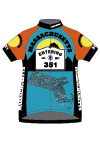In April 2023, Mike is tracing the raft journey of Huckleberry Finn, using the effort to raise money for cancer research at Dana-Farber as a supplement to his regular Pan-Mass Challenge (PMC) fundraising. Donations, large and small, are welcomed and can be made via this link.
Mike's route will take him from Hannibal, MO (Mark Twain's hometown) 900 miles through seven states, finishing in Vicksburg, MS. A 10-day trip down "Old Man River", taking in the sights and the history along the way.
I wrote a letter: Miss Watson, your runaway n****r Jim is two mile below Pikesville and Mr. Phelps has got him. HUCK FINN
I felt good and all washed clean of sin. I set there thinking how near I come to being lost and going to hell. And then got to thinking over our trip down the river, and I see Jim, and I couldn't seem to strike no places to harden me against him. He said I was the best friend old Jim ever had in the world and the only one he's got now. I studied a minute and then says to myself: "All right, then, I'll GO to hell" -- and tore it up.
-Adventures of Huckleberry Finn
Huck's epiphany -- to reject everything he was taught, that slaves aren't people, that they can't be your friends -- and to treat Jim as a fellow man, even though (given the teaching of the day) it meant he was going to hell.
Fictional Pikesville was the final stop in Huck's rafting journey south. Scholars believe it was designed to be set in southeastern Arkansas. Vicksburg is roughly 40 miles downriver from the Arkansas - Louisana line, so I will say that I made it further than Huck did.
The last two days have been a tour of the Mississippi Delta -- a journey I was intensely curious to make. I had visions of tar paper shacks without indoor plumbing. It is one of the poorest regions in the country. I was thinking worse than Arkansas.
I started with my final river crossing into Mississippi. My first night's destination was Greenville, the only real city between Helena and Vicksburg. I was immediately struck by how the countryside changed -- there were still plenty of cotton fields, but there were also lakes for boating. There were pecan orchards and hardwood forests and wild flowers. Magnolias and live oaks and cypress trees. It was pretty! And, along the road -- there were houses, and people. There were minuses to this (like, getting full out attacked by a pack of dogs, one put a hole in my sock trying to bite my leg). But -- all the things that I have earlier described -- curious people waving me down, talking to me in corner stores, directing me to the next place I could get water, marvelling at how "an old guy like you can ride so far"-- all more frequent in the Mississippi Delta.
I enjoyed a brief tour of the Winterville Mounds just north of Greenville -- behind Cahokia the largest Mississippian mound complex. I sadly arrived too late to visit the Flood Museum in Greenville -- in 1927, a levee broke 8 miles above town -- the water flooded an area nearly double the combined area of Massachusetts, Connecticut and Rhode Island. Rolling through the pancake flat countryside, it was easy to understand how a break could flood such a wide area.
I arrived in Greenville on Prom Night -- and my hotel ended up being ground zero for prom glam shots. Fancy cars, fancy dress, fancy makeup -- it was clear that the students (100% black that I saw) had access to plenty of money and resources. A long way from tar paper shacks.
The hotel directed me to a restaurant which would get excellent traffic in Boston (and charged Boston like prices). I noticed the clientele there was 100% white. I also noted that the best kept buildings in town were the banks. The big money in the area is the symbiotic relationship of banks and landowners. But -- it doesn't seem to be at the expense of everyone else.
Today was largely a "get to Vicksburg" day, but I made a detour to visit the town of Rolling Fork, which was hit last month by a devastating tornado. I am pleased to report that the town is recovering -- businesses are open, people are shopping and eating out -- and while the cleanup is ongoing (my video here), spirits seemed high. I also stopped to visit the town of Onward; Teddy Roosevelt's visit there led to the invention of the Teddy Bear.
As some of you pointed out, there has been a broader "hollowing out of America" that has impacted the country I have visited. But it's less about "offshoring" than the 100 year trend of requiring ever less farm labor. And without farm labor, I don't need a service industry to feed and house those farm laborers, or educate their children -- so no restaurants, grocery stores, gas stations, schools -- the building blocks of a modern service economy. Ultimately, the end state is robotic farms -- producing our food on land empty of people.
The good news is that our safety net programs have eliminated tar paper shacks in the Delta. The bad news is that they encourage people to stay who have no prospects for employment. These small towns don't have the infrastructure to attract outside employers. Perhaps a policy to encourage migration to where jobs are rather than encouraging staying in a dying community?
Dog Bit my Sock, somehow missed me
Mississippi Route 1 dead flat and straight
Rolling Fork (see video for more)
Where Teddy Bears come from

